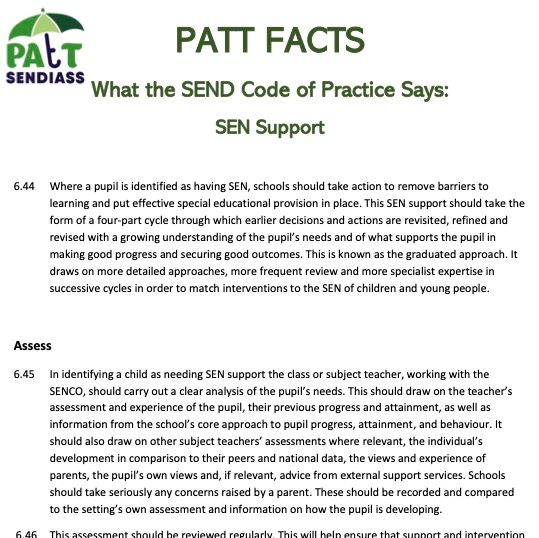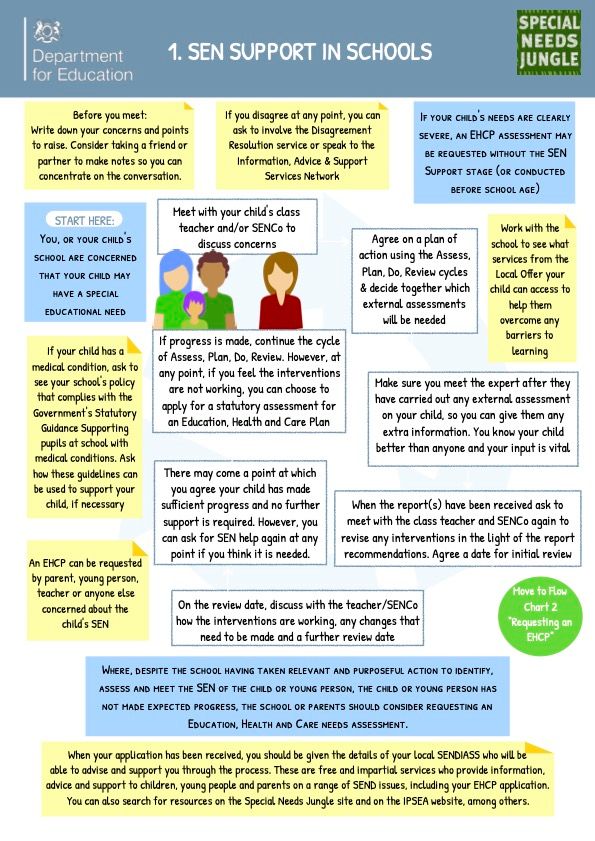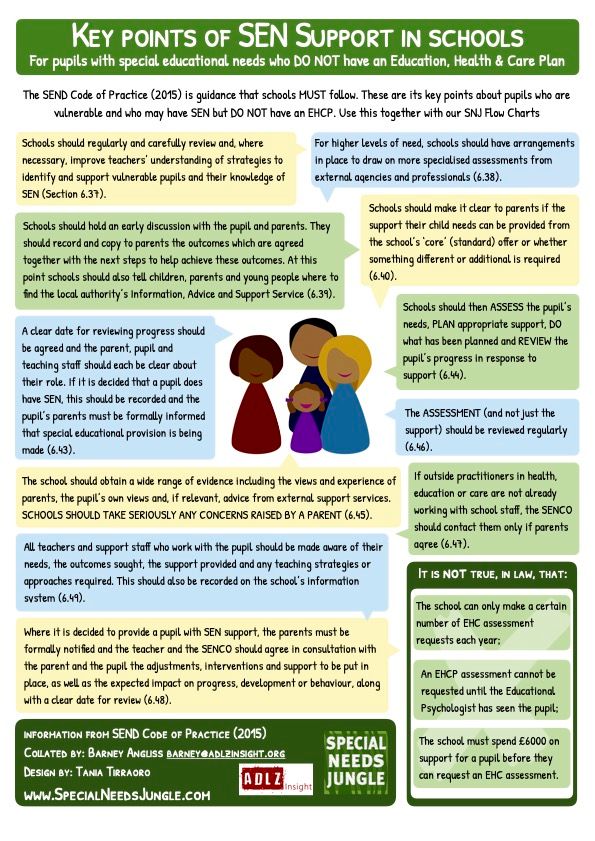Frequently Asked Questions about SEN Support
Below are some helpful answer to questions posed by parents and carers of children with SEN, or who are struggling at school

-
My child has Special Educational Needs (SEN). How can I get involved in decisions about their support?
You should be involved in all discussion about your child's SEN, the SEND Code of Practice is really clear on this.
Make contact with your school SENCo to arrange an appointment. Then you have an opportunity to share your views and those of your child. You can also find out what support the school have or are planning to put in place.
Before a meeting it can be helpful to let school know what you would like to discuss. You could make a list and email it to them ahead of your meeting. Alternatively, hand it into your school office for the attention of the class teacher or SENCo.
-
My child’s school says they do not need to be on the SEND register as academic progress is being made?
A child may have Special Educational Needs or Disabilities, despite making expected academic progress. The Code of Practice says that when identifying SEN in schools...
‘It can include progress in areas other than attainment – for instance where a pupil needs to make additional progress with wider development or social needs in order to make a successful transition to adult life.’
‘It should not be assumed that attainment in line with chronological age means that there is no learning difficulty or disability. Some learning difficulties and disabilities occur across the range of cognitive ability and, left unaddressed may lead to frustration, which may manifest itself as disaffection, emotional or behavioural difficulties.’
6.18 & 6.23 Code of Practice
Talk to school about what your child is finding difficult and ask what support might be put in place to help them. The school’s own website could be a good starting point. They may detail some of the programmes or interventions they offer.
-
My child’s school have said they cannot afford to provide what my child needs. What can I do?
The law is very clear that schools must identify, assess need and then plan support based on this information. Where school have identified what a child needs, this should be put in place. See our page about SEN Support in Schools for more information.
Sometimes it can be useful to talk with school about what they could put in place. Perhaps they are unable to provide a one to one at lunch but may be able to suggest a supervised club, for example.
-
School say they can only provide support if I get a diagnosis. Is that right?
This is incorrect. SEN is about the needs of a child, not the diagnosis. Schools have a duty to identify SEN. They must use best endeavours to make sure a child with SEN gets the support they need. See our page about ‘SEN Support in Mainstream Schools’ for more information.
There is also some government guidance for schools 'Supporting pupils with medical conditions', which highlights that schools should not wait for a formal diagnosis before providing support for a medical condition.
-
My child is struggling but school doesn't see any difficulties. What can I do?
Some children will appear on the surface to be OK. Underneath, they may be finding things difficult and feeling too anxious or self-conscious to ask for help. It can be useful ahead of any discussion with school to talk to your child, ask them what they think might help them in school.
Try to find out what they are finding difficult and what is going well. Sharing this information with school should help plan what support might be needed. See our page about SEN Support in Mainstream Schools.
For example, some Autistic children may find ‘free time’ difficult. Some, after a long day at school, might struggle to regulate their emotions and can sometimes feel overwhelmed. Often parents refer to this 'overwhelm' or as a 'meltdown'.
It can be useful to try to build in some structure at home. A home timetable on display for what happens now and next can be helpful.
The National Autistic Society have some useful pages found by clicking the following links:
Obsessions, repetitive behaviour and routines explained
Visual supports - types and uses
-
My child is on the SEN Register and has support in school. How do I know what is in place and if it is having an impact?
The SEN Code of Practice states that SEN Support in school should be documented and reviewed termly. You should ask your child’s teacher or SENCO for a written copy of their support information. Each school has their own term for this document. It may be called a “One Plan”, an “IEP”, or a “Student Support Plan”. Whatever they are called, they should contain information on your child’s diagnosis (if they have one) and/or difficulties and strategies to address them. It should also outline what interventions and additional learning support is in place. This document should be reviewed termly and if progress has not been made, consideration should be given to what additional support needs to be implemented and whether an EHC Needs Assessment might be necessary.
-
My child is fine at home but school staff call every day about issues in the classroom.
It will be helpful to meet with school to discuss the issues and consider any patterns of behaviour. It is very common for children and young people to present differently at home and at school. The environments and activities can be very different.
We recommend acknowledging the school view and experience. This does not make your experience any less valid. It is important to look at the whole view to unpick what your child is finding most tricky and what might make things easier.
Share with school any strategies you use. Often parents are using strategies without even realising. It can be less confusing for a child where the strategies at home and school are the same.
Praising positive behaviour can be really effective. You can also explain you are finding the daily calls stressful and agree how school will communicate with you in the future.
Where school have tried all strategies and are unsure how to support, they should seek specialist advice.
-
My child finds it difficult to ask for help in school and doesn't want to stand out as different.
This is very common. Children with SEN are often anxious about raising their hand in class and asking for help. As they get older and start to become more aware of their differences, they often don’t want to attract more attention to themselves. You could acknowledge to your child that many young people find this tricky. Explain that it is ok to explore with school ways of asking for help which your child will find easier.
For example, it could be agreed that your child shows he/she is struggling by placing an item on the table. This might be a coloured card system or a piece of school kit like a rubber. The teacher or TA comes over discreetly, going to other children first to see if they are OK.
In this way, your child doesn’t stand out. Some young people prefer to speak to a key person at agreed times in the week. They can talk about what they are finding difficult and explore ways to make this better.
-
I'm in disagreement with school over my child's progress. How can we move forward?
This comes back to the four-stage cycle of SEN Support. Once required outcomes have been agreed, progress should then be measured, and support monitored as part of the cycle.
At the review stage the evidence should show whether your child has achieved the outcomes. If not, support should be reviewed and changed with fresh targets set where necessary.
-
I have been told to go for a private dyslexia diagnosis. Can you advise me?
Some schools will have someone able to carry out Dyslexia screening. Identifying Dyslexia is complex, a screening is not a diagnosis. There could be many reasons your child may be having difficulties.
It is quite common for parents to seek a private diagnosis. Schools should consider involving specialists for any child that continues to make little or no progress, despite targeted support. For more information, follow these useful links:
British Dyslexia Association Website
Ask Thurrock – The Local Offer





